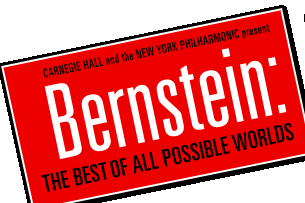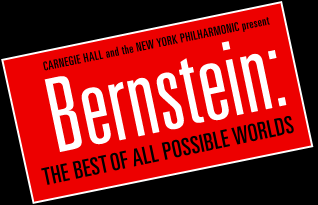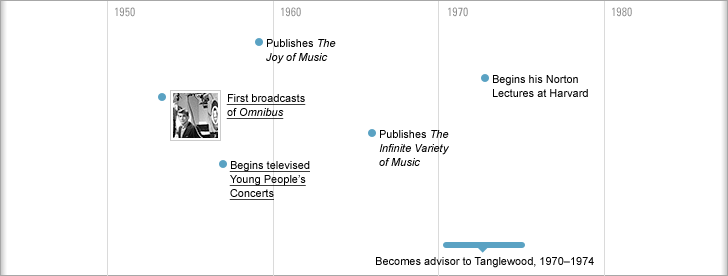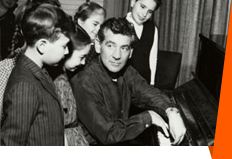
THE EDUCATOR
- Leonard Bernstein
- Stage & Film
- Concert Music
- The Conductor
- The Educator
- The Social Activist
- Bernstein’s New York
- Bernstein and Faith
- Bernstein at Carnegie Hall
- Bernstein and the New York Philharmonic
- Bernstein Memory Bank
- Bernstein Timeline
“Only a society prepared by education can ever be truly a cultured society …Children must receive musical instruction naturally as food, and with as much pleasure as they derive from a ball game.”
Video
Nina Bernstein on her father’s need to connect with other people.
From Reaching for the Note, Dir. Susan Lacy, 1998.
Related Video
 |  |
 |  |
 |
Focus On
Televisions and Teachers
That television and Leonard Bernstein came of age at roughly the same time was a fortunate coincidence for classical music. As many of his friends and family have observed, Bernstein was a natural and gifted teacher, capable of conveying a special blend of exuberant emotion and careful analysis that people found irresistible. Television brought the intensity and enthusiasm into people’s living rooms and allowed Bernstein to share his musical teachings with countless people all over America who otherwise would never have been able to experience them in person.
The state of television today can make it seem improbable that there was once a wildly popular and nationally broadcast program devoted exclusively to fairly sophisticated explanations of classical (and some popular) music. Many people in television in the 1950s saw the medium’s potential as an instrument of education, which helped make Bernstein’s Young People’s Concerts with the New York Philharmonic program possible—but it was his …
From Leonard Bernstein: American Original
Tim Page on
Bernstein’s Impact as an Educator
In addition to his distinctions as composer, pianist, and conductor, Leonard Bernstein was also the most influential music teacher in history. A big claim, of course, but it stands up to analysis. I met the man only four or five times (and then briefly), but thanks to his many appearances on television I can say that I studied with Leonard Bernstein, and so did most of my contemporaries. Indeed, if you grew up in the United States between 1955 and 1970, and you care enough about music to be reading this book, you are almost certainly one of Bernstein’s students, too. And, fortunately, the programs are still extant, permitting the man Virgil Thomson called “the ideal explainer of music, both past and present” to extend his reach far beyond the grave. …
For those of us who were raised in rural surroundings, far from concert halls and subscription series, watching and listening to Bernstein take us through music four times a year, whether Beethoven, Strauss, Gershwin—and even, on several occasions, the Beatles—was like a passport into another world. Bernstein took naturally to the television medium, and with his concise, cogent explanations, his balletic movements, his poetic face—suffering and ecstatic—he seemed the very personification of the art of music.
Excerpted from Leonard Bernstein: American Original, by Burton Bernstein and Barbara B. Haws (HarperCollins, August 2008).
Listen
Excerpt from “Berlioz Takes a Trip”—Leonard Bernstein explores the Symphonie fantastique with musical illustrations from the New York Philharmonic
Leonard Bernstein, Conductor and Narrator. Sony Classical SK 60968.
Find this and more of Leonard Bernstein’s work at ArkivMusic.com ›
Related Links
Support
Support Festivals at Carnegie Hall
Join Today! ![]()
Leonard Bernstein: American Original
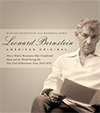
By Burton Bernstein— former New Yorker writer and Leonard’s brother—and the New York Philharmonic’s historian, Barbara Haws.
Buy now ![]()
Related Events
© 2001–2008 Carnegie Hall Corporation
- Home
- |
- Multimedia
- |
- Press
- |
- Partners
- |
- Supporters


